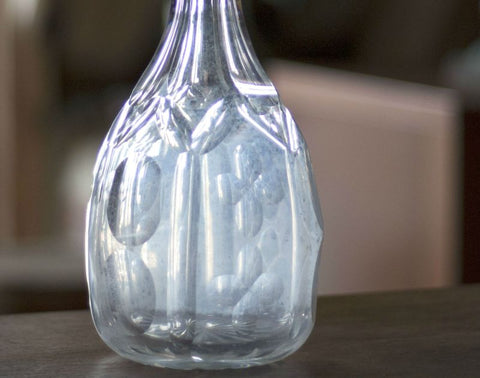How We Clean and Care for Glass Decanters

Glass decanters add a lot of style to a dining occasion. Typically, we use decanters and carafes for serving wine, port, sherry and whisky. But, they are also suitable for vodka, tequila, gin and liqueurs.
Quick tips from Lavish Shoestring:
- Clean soon after use
- Wash by hand in a warm soapy water
- Use rock salt or rolling balls for tough wine stains
- Using dishwasher is not recommended
- Old glass decanters can get clouded – this is normal
Did you know
Traditionally, tough wine stains inside decanters and carafes were removed by rolling a few buckshots. Nowadays they are called decanter cleaning rolling balls.
A properly fitted stopper will lock in the decanter neck with just a light twist, sealing the contents similar to a bottle cork.
How to clean
Wash all glass decanters by hand in warm water with soap and a sponge. Avoid using hot water or a dishwasher – the glass will crack. Clean the decanter soon after using – that way it is easier to clean wine stains. For tougher wine stains use a few spoons of salt with warm water. Let the decanter soak and then rinse. You will achieve the same result with rock salt and water or with rice and vinegar.
How to care
Maintain your decanter the same way as you do your old wine glassware.
Don’t leave a drink inside for a long time: it will stain and get spoiled sooner than it will inside a bottle.
For decanters with silver and silver-plated mounts: polish the silver surface often to avoid tough tarnish.
Broken or lost stopper – what to do?

Each decanter has a stopper that matches its style and neck fit. Original stoppers on good hand-made decanters bear a small engraved number, with the same number engraved on the base or the neck. Damaged or lost stoppers can be replaced with period or modern replicas. All you need to do is pick a similar style and grind the stopper to fit in the decanter neck. Grinding is a straightforward process and glass restorers charge £10-£20 per stopper fitting.
Chipped decanters



Glass decanters are prone to damage around the rim, on the stopper tip, and, depending on the design, on their body decoration. Old decanters often have small surface chips around the collar and on the stopper – where the most contact between the two happens. Cut-glass decanters with elaborate surface decoration can have small surface chips, sometimes called flea bites. Both types of damage are expected and, realistically speaking, cannot be avoided for long. But all surface chips can be fixed by light polishing or small reduction of glass in that part. A good glass restorer would usually charge about £10 per chip.
Clouded surface – what to do

Clouded surface appears on some old decanters – this is a normal occurrence and happens due to surface wear from the acids present in drinks. Our advice is always to leave the decanter as it is – once you fill it with liquid, the cloudiness disappears. Removing the cloudiness requires a specialist who has the right chemical solution and a vibrating machine.
However, if the cloudy glass is due to hard water limescale, then simply use a kitchen descaler.

Enjoy your drink!


